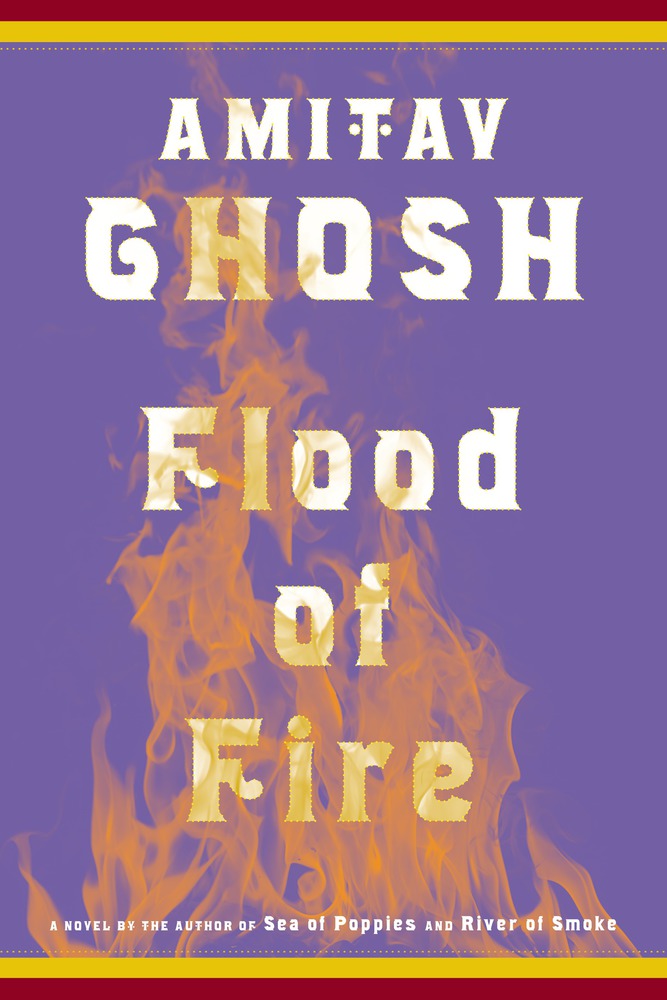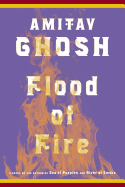 Amitav Ghosh concludes his Ibis trilogy (Sea of Poppies, River of Smoke) with Flood of Fire, a panoramic fictional re-creation of the lead-up to the Opium Wars of 1839 to 1842. This richly populated novel teems with characters on both sides of conflicts large and small; like the preceding novels, it's another mesmerizing story that captures rippling costs of human greed and ambition that alter lives and countries in profound and permanent ways.
Amitav Ghosh concludes his Ibis trilogy (Sea of Poppies, River of Smoke) with Flood of Fire, a panoramic fictional re-creation of the lead-up to the Opium Wars of 1839 to 1842. This richly populated novel teems with characters on both sides of conflicts large and small; like the preceding novels, it's another mesmerizing story that captures rippling costs of human greed and ambition that alter lives and countries in profound and permanent ways.
Zachary Reid, the wide-eyed young American son of a slave, who passes as white and lived through the voyage of the Ibis in Sea of Poppies, reappears here as a central character. He is now in Calcutta employed as a "mystery," a repairman on a riverboat owned by the wealthy Burnhams. Mrs. Burnham soon coaches him in the fine points of giving and taking sexual pleasure, within the social confines of a rigid colonial society and a very illicit affair, even while he is schooled as an opium trader by Mr. Burnham.
Other characters, too, reappear from the earlier books. Among the passengers aboard the Hind, a ship sailing from India to China, are Kesri Singh, a soldier whose sister Deeti was a key character in Sea of Poppies, and Shireen Modi, widow of an opium trader, who travels to China to reclaim his lost fortune and reputation, only to find herself drawn into his secret life. These disparate characters' stories converge when British India, to protect its opium wealth, prepares to attack China, which has cracked down on opium smuggling, and the Hind is requisitioned for the attack. The spectacular battle scenes result in a devastating Chinese defeat and the British seizure of Hong Kong.
Flood of Fire is vintage Ghosh. He mixes war drama with domestic comedy, playful glee with skewering critiques. He does not shy away from the human tragedies that serve to count the costs of geopolitical and colonial ambitions. Ghosh's skill at balancing the high and low is especially effective in the passages dealing with Zachary and Mrs. Burnham, where class, gender and race collide. When they first meet, Mrs. Burnham becomes determined to instill in him Victorian moral values, especially those in the sexual arena. Her prim bawdiness and pidgin double-speak infuse these sections with an exuberantly lowbrow humor, even as Ghosh subverts expectations about the equations of privilege, power and morality.
Sharp, epic, teaming with characters and activity, Flood of Fire is bravura story telling. It is world history writ large through the minutiae of social interactions by a master of the craft of fiction. --Jeanette Zwart, freelance writer and reviewer
Shelf Talker: Flood of Fire is another expansive tragicomedy, teaming with characters, action and relationships--satisfying both on its own and as a fitting conclusion to Amitav Ghosh's extraordinary Ibis trilogy.









 Australian online retailer
Australian online retailer 
 The store offers a range of titles with an emphasis on Southern literature, children's/YA titles and culinary literature. M. Judson aims to be "more than a bookstore," its website said. "It's a literary hub, a cultural hive. It's trade in a story-centered lifestyle, and that's the philosophy reflected in everything we do. You'll see it in the farmer-inspired seasonal dishes on our menu, our commitment to local artists, our funky gifts and vintage housewares, and our special events and author signings."
The store offers a range of titles with an emphasis on Southern literature, children's/YA titles and culinary literature. M. Judson aims to be "more than a bookstore," its website said. "It's a literary hub, a cultural hive. It's trade in a story-centered lifestyle, and that's the philosophy reflected in everything we do. You'll see it in the farmer-inspired seasonal dishes on our menu, our commitment to local artists, our funky gifts and vintage housewares, and our special events and author signings." Alan Cheuse
Alan Cheuse Photographer Richard Corman gives ballerina Misty Copeland a copy of Misty Copeland: Power and Grace (Michael Friedman Group), featuring images of and quotes by the inspiring dancer (and
Photographer Richard Corman gives ballerina Misty Copeland a copy of Misty Copeland: Power and Grace (Michael Friedman Group), featuring images of and quotes by the inspiring dancer (and 

 Amitav Ghosh concludes his Ibis trilogy (Sea of Poppies,
Amitav Ghosh concludes his Ibis trilogy (Sea of Poppies, 